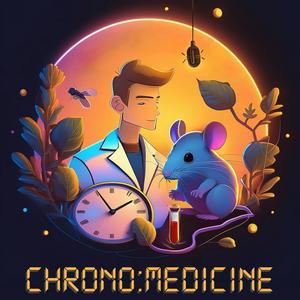E28 - The Central Clock & Melatonin with Michael Hastings (EBRS 2025 Spotlight 1)
In collaboration with the organizers of the 18th Congress of the European Biological Rhythms Society - EBRS - taking place in Luebeck in Northern Germany from the 24th to 28th of August 2025, three congress speakers are interviewed to talk about their research. As the first spotlight, Prof. Michael Hastings (MRC Laboratory of Molecular Biology, Cambridge) talks about his research journey from circatidal rhythms in marine organisms to circadian and circaannual rhythms in mammals. Our main focus is on the neurochemistry within the central clock of the suprachiasmatic nucleus (SCN) enabling it to tell time. We discuss the most relevant factors that support the SCN in telling time, and what means the SCN has to synchronize other clocks within our body. With respect to melatonin, we discuss its role in sleep versus informing our body about the current season. We also talk about supplementing melatonin for specific populations. Lastly, Michael shares memories from attending previous EBRS congresses and why you should consider joining it this year.Chapters:(0:00:39) Introducing the EBRS 2025 spotlights(0:03:51) Michael Hastings(0:07:17) Circatidal ryhthms(0:14:38) The central clock or SCN(0:24:47) Different zeitgebers(0:35:17) Melatonin(0:46:14) Melatonin as a sleeping aid(0:51:38) EBRS congress experience(0:58:22) Career advice(1:10:02) Funny anecdote(1:13:54) OutroStudies that Michael refers to:Reviews on circatidal rhythmshttps://doi.org/10.1016/j.cub.2008.06.041https://doi.org/10.1016/j.tig.2024.01.006 Prevalence of mutations in clock genes to make the period length shorter or longer than approx. 24 hours, rare familial sleep disordershttps://doi.org/10.1038/s41386-019-0476-7 Mice mutations support that the same enzymes are involved as in the human sleep disordershttps://www.nature.com/articles/s41583-018-0026-z Period genes in the SCN are activated by lighthttps://doi.org/10.1016/S0092-8674(00)80494-8 Caffeine can phase shift the circadian clockhttps://doi.org/10.1126/scitranslmed.aac5125 Manipulation of NPY and serotonin can shift the SCN clock https://doi.org/10.1152/ajpregu.00320.2022 Human cortisol levels increase before awakening in anticipation of wakehttps://doi.org/10.1677/JOE-07-0378 Temperature in the physiological range can act as a zeitgeber to entrain peripheral clockshttps://doi.org/10.1016/S0960-9822(02)01145-4 When interfering with neuropeptide levels within the SCN, you can entrain the SCN with temperature cycleshttps://doi.org/10.1126/science.1195262 High levels of estradiol make the SCN run fasterhttps://doi.org/10.1126/science.557840 Melatonin is a transplacental zeitgeberhttps://pubmed.ncbi.nlm.nih.gov/3780553/https://doi.org/10.1177/074873049701200603 Martha Gillette and others applied melatonin to brain slides containing the SCN, showing that this could shift the SCN clock, the sensitivity of the SCN to this melatonin effect was found to occur during daytime (when melatonin is not released naturally)https://link.springer.com/article/10.1007/s00441-002-0576-1 GWAS papers: variance of melatonin receptor are related to the type 2 diabetes andmetabolic disordershttps://www.nature.com/articles/ng.277https://www.nature.com/articles/s41574-018-0130-1Contacting Michael Hastings:Homepage: https://www2.mrc-lmb.cam.ac.uk/group-leaders/h-to-m/michael-hastings/Email:
[email protected]EBRS homepage:https://www.ebrs-online.org


